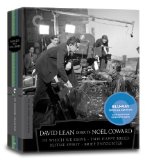| Reviews & Columns |
|
Reviews DVD TV on DVD Blu-ray 4K UHD International DVDs In Theaters Reviews by Studio Video Games Features Collector Series DVDs Easter Egg Database Interviews DVD Talk Radio Feature Articles Columns Anime Talk DVD Savant Horror DVDs The M.O.D. Squad Art House HD Talk Silent DVD
|
DVD Talk Forum |
|
|
| Resources |
|
DVD Price Search Customer Service #'s RCE Info Links |
|
Columns
|
|
|
David Lean Directs Noël Coward
THE MOVIES:
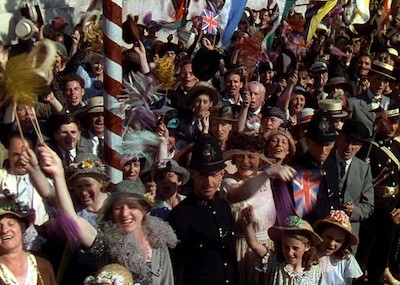
One was an accomplished film editor looking to move up the cinema ladder, the other a successful playwright ready to embrace motion pictures in full. David Lean, the man who would go on to make Lawrence of Arabia and Dr. Zhivago, two of the biggest big-screen epics of all time, began his career on a relatively moderate scale by comparison, but teaming with a writer as popular as Noël Coward (A Design for Living) was somewhat epic unto itself. The pair made four films between 1942 and 1945, showing increasing progress across the quartet and culminating in a genuine masterpiece of romantic cinema. Criterion finally collects all of these movies under one banner, David Lean Directs Noël Coward, boasting new high-definition transfers and a healthy selection of bonus materials.
* * *
All you need to know about the demeanor of 1942's In Which We Serve comes from a scene three-quarters of the way through the nearly two-hour movie. A sailor of a lesser rank receives a letter that says his superior's wife and mother have been killed in the blitz, and he has to go and tell the other man the bad news. They speak plainly, their voices maintaining a hushed reverence. It's the epitome of the cliché of British reserve. Forget the upper lip, everything is stiff. And if you want to know just what kind of drama this propaganda production is, the scene ends with the younger man telling the older patriarchal figure that, though that fellow's family is dead, his own wife survived and had a baby. One generation passes away, and another carries on.
The first collaboration between David Lean and Noël Coward had one specific purpose: to celebrate the troops and prepare a nation at war to handle the hard times ahead. There will be loss and heartbreak, but there will also be much to be proud of. The British Navy? Best there is!
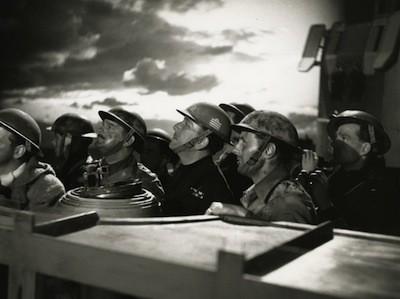
In Which We Serve is a somber picture. It was instigated by Coward, who not only wrote, but he co-directed with a young David Lean and also starred in the movie as Captain "D." Lean had worked on other movies, editing notable pictures like Anthony Asquith's Pygmalion and the Archers' own propaganda piece The 49th Parallel; however, excepting some uncredited work directing sequences of Major Barbara, he had never worked behind the camera. Coward brought him on to aid in helming this dream project: a tribute to the Royal Navy that would attempt to portray true naval life. In this, In Which We Serve is successful. It's one major recommending point to this day is its incredible footage of the naval ships being built and operated. It's celluloid as essential to the historical record as any wartime documentary.
This stuff is fascinating, as is some of the battle footage. The filmmakers don't overdue it in the combat scenes. The visual language for overly dramatic fight sequences was perhaps not yet developed, but there is something riveting about the unadorned nature of the skirmishes here. Shot from the ship's deck, these scenes largely feature men taking coordinates, loading guns, and firing as the German ships circle back and forth, emptying ammo clips and dropping bombs. Sure, it's a little dry, but the whole of In Which We Serve is dry. Even when it is melodramatic, it's as dry as Noël Coward likely preferred his martinis.
The careful measurement of In Which We Serve's narrative is both a fault and a virtue. While it likely served to rally the British people behind their armed services without hitting any regrettable racist caricatures or resorting to jingoist language, the lack of blood and guts ultimately drags. In Which We Serve is a long movie, easily too long. The upside is that Coward has invented a fantastic structural conceit for the film.
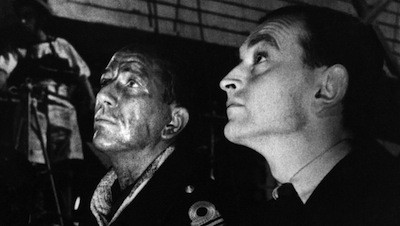
In Which We Serve begins out on the ocean as the HMS Torrin contends with a Nazi squadron. They end up beating the German's ace pilot, but not before he delivers a crushing blow. A handful of men make it overboard, and they cling to a life raft, watching their ship sink and reminiscing about what got them there. The main focal points are the Captain (as played by Coward), and two men in his service, one an officer and one a lower-ranked enlisted man (the ones mentioned at the outset, and played by Bernard Miles and John Mills). We see the captain's family, complete with wife (Celia Johnson) and kids, alongside the officer's childless but loving marriage and the younger man's new romance. He marries just before shipping out (his wife is Kay Walsh). The back-and-forth structure, including the captain's own underwater reverie, dreaming of his beloved in anticipation of drowning, allows us to see how the camaraderie of warriors develops and also look at the consequences back home. How the battle affected the loved ones who were left behind must have been of utmost concern to the English populace.
All of the lead actors are very good, with Mills being the most memorable as the always-genial Shorty Blake. The most striking supporting performance, though, comes from a very young Richard Attenborough, stepping on screen a few years before his creepy star turn in Brighton Rock. Here he plays a disgraced soldier getting a second chance. Attenborough makes for a very convincing onscreen drunk.
Despite neither Lean nor Coward having directed before, and forgiving the overlong running time, they show an assured hand while dealing with an extremely ambitious, complicated production. Combat footage is never easy, and I would guess particularly not on the water. In Which We Serve never looks faked or chintzy. It's a quality war picture, and even if it is totally dated, it serves its purpose.
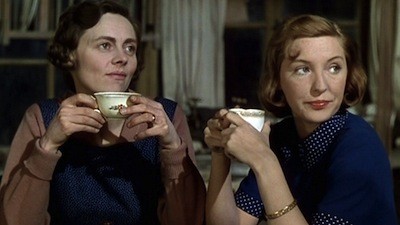
There is a breezy simplicity to the 1944 Lean/Coward collaboration This Happy Breed that almost completely obscures the ambition of the piece. Based on Coward's original play, David Lean's team--including Ronald Neame on script and camera, as per usual--remove any staginess from the production and create a seamless history of one family's ups and downs from just after the end of World War I to the sketchy days just prior to World War II.
Robert Newton and Lean-regular Celia Johnson star as Frank and Ethel Gibbons. Following Frank's discharge from the service, the Gibbons family--two daughters, a son, Ethel's mother, and Frank's sister--move into a home on High Street in London. Next door is one of Frank's army buddies, Bob Mitchell (Stanley Holloway, My Fair Lady), and so this new homecoming is also like a reunion. Bob has one son, Billy (In Which We Serve's John Mills), who wants to be a sailor, and he will eventually fall for Queenie Gibbons (Kay Walsh). The length of their relationship is one of This Happy Breed's many subplots.
The script moves swiftly, leapfrogging over the years, showing the changing times through the news, popular entertainment, and the advancement of technology, particularly the radio. The film examines just about everything: the influence of Communism and workers strife, increasing freedom for women, crackpot spirituality, and the encroaching winds of war. Parent and child disagree and then find common ground. Hotheaded youth succumbs to everyday life. Babies are born, family members die, and through it all, Frank and Ethel persevere, growing older and more gray. This Happy Breed is punctuated with two drinking binges by Frank and Bob--one midway through the picture on the night that Queenie disappears and the other near the end, when Neville Chamberlain woos England into believing that war is being averted. The men represent a generation that has seen much trouble in their time, and who are cautious about how easy it will be to avoid such trouble again.
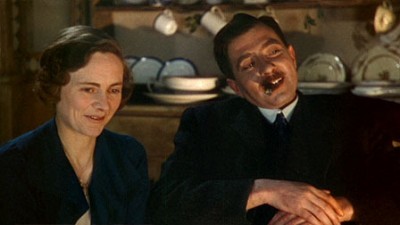
This Happy Breed is phenomenally compact, and yet it doesn't sacrifice depth of story or character. It would have been rather easy to rely on cliché and stereotype, and in some ways, that happens--the other daughter, Vi (Eileen Erskine), falls for a rabblerousing Bolshevik (Guy Verney) who ultimately settles into the expected role of wage earner and social conservative--but the brilliance of Noël Coward's dialogue is how he uses average conversation to reveal so much about the people engaged in the talk. These are people really saying something, not just filling the time between opening and closing credits. One of the best scenes is when Frank gives his son, Reg (John Blythe), advice on the day of his wedding. Robert Newton nails the speech, covering his nerves with a stern, fatherly tone, and Coward's writing expertly dances around sensitive issues without resorting to trite euphemism. Frank says plenty about the birds and the bees both without ever mentioning either by name.
This Happy Breed doesn't build to a big crescendo. Rather, the story evolves to a natural place, and life's changes dictate how the Gibbons family will exit their cinematic excursion. In many ways, it reminds me of William Wyler's The Best Years of Our Lives, even if it is on a completely different continent and on the opposite side of WWII. The drama is never overwrought, the sentimentality never mawkish, and the decisions never easy, holding up a compelling mirror to an audience who likely had no difficulty recognizing themselves in the faces in the glass.
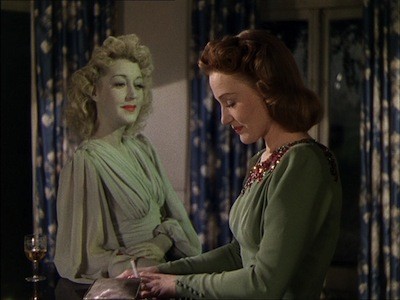
Released the same year as their final film together, Brief Encounter, David Lean's adaptation of Noël Coward's hit comedy Blithe Spirit couldn't be further in tone from what would become the duo's unassailable masterpiece, and yet thematically, they are actually pretty close in terms of their deeper narrative concerns. At the heart of Blithe Spirit beats questions of conjugal love, infidelity, and a cast of characters who soldier on together even when the soldiering gets rough.
Rex Harrison leads the cast of Blithe Spirit as Charles Condomine, an upper-class author content with his posh lifestyle, so much so that there is even some suggestion that his writing isn't as good as it once was. Charles is married to Ruth (Constance Cummings), who is his second wife. She seems an able companion for him. Their senses of humor are in line with one another, and she goes along with his mad ideas. The current one is to have a medium come to their home for a séance. Madame Arcati (Margaret Rutherford, also in Asquith's The Importance of Being Earnest) is the village joke, but she's exactly the punchline Charles is waiting on: he is hoping to learn the art of the spiritual charlatan for the latest mystery he is penning.
Naturally, since this is a light comedy, that floating table holding the crystal ball is going to turn, and Charles is going to get what is coming to him. His first wife, the late Elvira (a saucy Kay Hammond), has been a presence in his house since her passing seven years ago, even if only as a topic of discussion between Charles and Ruth. Arcati's shenanigans make that presence far more real: Elvira has returned as a ghost, one that only Charles can see and hear. His panic and the seemingly one-sided conversations he has with the ghost cause a rift with the understandably irritated second wife--but that's only the beginning of Charles' supernatural woes.
Blithe Spirit is, at a surface glance, charmingly toothless. The comedy is light and airless, playing rather innocently with the notion of a restless afterlife. In other words, it's as far from spooky as you're likely to get. Watching it actually reminded me of what a big fan of the Topper films I was as a child. I very much liked the idea of having spectral friends that only I could see, standing by my side, helping me out of scrapes. (Naturally, I was also on Jimmy Stewart's team any time I watched Harvey.) Blithe Spirit made me want to revisit Topper to see if it's as harmless as I remember.
Because, of course, being a Noël Coward script, Blithe Spirit's frothy appearance masks some darker, more mature undertones. There is much one can infer from the coded barbs that were the author's trademark. (Such as, the suggestion that the previous maid got a sudden case of the marrieds because she was pregnant; it was only 1945, after all, and censorship being what it was....) Ruth's jealousy of the unimpeachable, crystallized image of her predecessor gives way to a truer picture of Elvira when the dead woman returns and we see how she icily bullied her husband as a matter of foreplay. Presumably since they no longer have to get along by way of corporeal cohabitation, the veil between Charles' romanticized feelings for Elvira and the side effects of her acidic promiscuity start to become more clear.
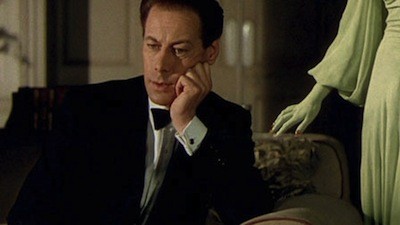
The ensemble cast is perfectly gung-ho and able-bodied. They stay committed to Blithe Spirit even when some of the slapstick gets clunky. (Lean's direction seems to grow more wooden in direct proportion to how silly the story gets.) Rex Harrison adheres pretty closely to the Rex Harrison brand, so he is good, but offers few surprises here (none of that nastiness that makes his turn as Henry Higgins stand out amongst his filmography). Constance Cummings and Kay Hammond are both excellent as the wives: one steadfast and plucky, the other sexy and devious. Even better though, is Margaret Rutherford's performance as the spiritualist. She is an exceptional character actress, and she creates a busy-bodied, addle-brained persona for the old woman. Rutherford's performance is both physical and verbal, and despite the obvious craft put into it, surprisingly natural.
Perhaps more impressive, though, is how Lean and cinematographer Ronald Neame (who also contributed the script) handle Blithe Spirit's special effects. There is less cinematic trickery here than there are tried-and-true stage techniques. Phosphorescent make-up and matching, flowing robes give Elvira her ghostly pallor. Only the woman's lips have maintained a lively hue: red, passionate, alluring. Symbolically, the lady has yet to give up her last breath.
Those who have seen Blithe Spirit will know I am being coy in how I doled out that last compliment. There are some surprises to be had in the story's later acts that, while not necessarily mind-blowing, add to the fun. The pace of the film increases as the situation becomes more desperate and Charles seeks to free himself from being haunted.
The final scenes add further weight to the relationships, with us learning that Charles himself was not quite the gentleman he maybe pretended to be. Yet, there is also some validation of these relationships. Coward's script may not necessarily seem to get behind the sanctity of marriage, but it does land firmly on the side of lifelong companionship--no matter how maddening or begrudging it might become. Some people are just meant to be stuck together.
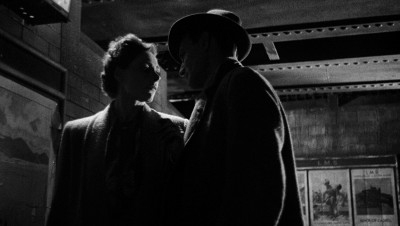
For me, the original Criterion DVD for Brief Encounter was one of those amazing finds that collectors always love. I picked it up in a used bin at a now-closed Portland record store, paying a measly amount. $8, I think. (Maybe $12. Those are the two numbers that come to mind.) That's an amazing deal, and there was no hesitation on my part, I snatched it up. Once I was home, I watched it almost immediately. Used discs always get priority in case there is an imperceptible-from-the-outside defect lurking in its second-hand nether regions.
In all honesty, the film didn't blow me away. I think part of it was that I was watching it less to be watching it and more to be checking it out, and so I probably tried to squeeze it into my schedule at an inappropriate time. Also, I don't think Brief Encounter is one of those films that does hit you right away. It's certainly not a mind-blower. When it ends, you're not going to turn to the cat, eyes wide with disbelief, and ask, "What the hell just happened to me?"
Rather, Brief Encounter is better as it ages. You need to take some time with it and let it settle. Its aftertaste is a big selling point. I know that as time passed, my memories of it grew increasingly fond.
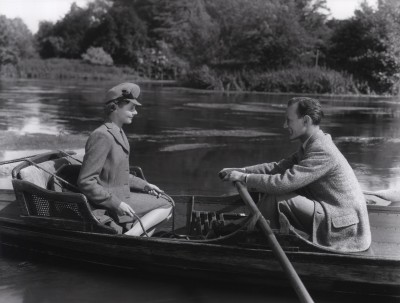
Like most of their collaborations, David Lean adapted this intimate portrait of two lovers from a play by Noël Coward. Originally called Still Life when on the stage (and predicting some of the housewife longing in the Suede song of the same name), the play moved to the screen under the pens of Lean, Coward, and Anthony Havelock-Allan. It stars Celia Johnson (now familiar from the previous films in the set) as Laura and Trevor Howard as Alec, two lonely people who are married to others but find love in each other's arms.
Or, more precisely, they find love avoiding each other's arms. Theirs is an affair that never quite gets going, consigned to safe meetings in public places, the companionship more important than the sex. Their same-place, same-time appointments in a confined area reminds me a lot of another favorite of mine, Visconti's Dostoevsky-adaptation Le notti bianche. Unlike that film, however, the affair in Brief Encounter isn't driven so much by hormones and romantic gesture as it is by loneliness and past mistakes. Neither Laura nor Alec ever foresaw that their lives would become so passionless, that they would end up with mates that weren't right for them. Social mores and familial obligation demands they stay the course and not indulge in the violence of emotion that adultery can foment. Neither of Visconti's lovers is married, and it's the violence of emotion that proves their downfall. Then again, perhaps it is also what keeps Lean's couple apart, as their efforts to be alone are what end up pointing out how foolhardy they are being.
Lean keeps the setting cramped in Brief Encounter. The locations of the story feel stifled, closed-in. Even when the ceiling is high or the room empty, he has his actors lean in, substituting the cramped quarters of conspiracy for the cramped physical quarters. Lean, working with director of photography Robert Krasker, shoots in black-and-white, capturing every dark shadow and white pillow of steam, a psychological landscape not unlike film noir. In fact, Brief Encounter could almost be considered a noir of the heart, what with its voiceover, the emphasis on the past (including how it's structured as flashback) and inescapable fate. Hide a sack of money somewhere in the train station, put a gun in an avenging husband's hand, and you've got a B-vehicle tailor-made for RKO.
* * *
Brief Encounter was the last of the Lean/Coward teamings. The director would next go on to direct a pair of Charles Dickens adaptations; the author would continue to have his works endlessly adapted, both to film and television (most recently, Easy Virtue was remade in 2008 with Colin Firth and Jessica Biel). He would even try his hand at directing again in the 1950s for a tv production of Blithe Spirit, presumably working to get it right where he believed David Lean got it wrong. As an actor, he'd appear onscreen a couple of more times; his last role was in 1969's The Italian Job. Lean made Ryan's Daughter a year later in 1970, and then did not direct a major motion picture again until his final film, A Passage to India, in 1984.
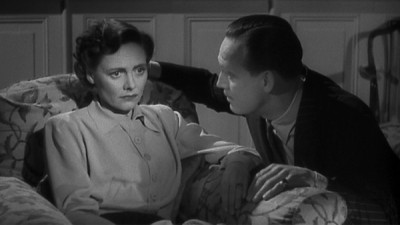
THE BLU-RAYS
Video:
All four films in the David Lean Directs Noël Coward collection are presented on their own individual discs, packaged in sturdy book-like cases and housed in an outer box. The movies are all shown in high-definition at a 1.37:1 aspect ratio, using newly restored prints from the British Film Institute National Archives.
Both In Which We Serve and Brief Encounter bookend the box as the two black-and-white films. The image quality for both is strong, with excellent resolution and a pronounced balance between light and dark. Detail levels are excellent, as they are for the two color films, This Happy Breed and Blithe Spirit. Grain is more evident in the color pictures, with This Happy Breed having the strongest resolution and the most natural hues. Blithe Spirit had an odd color palette, and some of the pastel-like look of the film stock may appear slightly "off" to modern eyes, but overall, it's an impressive restoration with an equally impressive transfer.
Sound:
All four movies are serviced with an uncompressed mono sountrack. These sound amazing, with no real discernible distortion or hiss. Dialogue is crisp and clear, and volume levels are well balanced.
The films also have English Closed Captioning for those who need it.
Extras:
In addition to the handsome boxed set design, consumers also get a thick booklet full of credits, photos, and critical essays on all the films.
Each movie gets its own specific extras on its disc, though the nature of some of these overlap, adding to the feeling that this is one complete package.
For In Which We Serve, viewers who want to dig deeper have the options of:
* An interview with Noël Coward scholar Barry Day
* The 2000 making-of A Profile of "In Which We Serve"
* A 1969 audio recording of Coward talking to Richard Attenborough
* The film's trailer
This Happy Breed:
* Interview with Barry Day
* 2010 interview with cinematographer and screenwriter Ronald Neame
* The film's trailer
Blithe Spirit:
* Interview with Barry Day
* A 1992 Southbank Show about the life of Noël Coward
* The film's trailer
Brief Encounter:
* Audio commentary by film expert Bruce Eder
* Interview with Barry Day
* The 2000 documentary A Profile of "Brief Encounter"
* A 1971 television program, David Lean: A Self Portrait
* The film's trailer
FINAL THOUGHTS:
DVD Talk Collector Series. David Lean Directs Noël Coward is an important boxed set, restoring significant films from early in a great director's career and highlighting the work of one of the early 20th Century's most important playwrights. You've got a war picture, a family drama, a light romantic comedy, and a deeply felt, tragic love story--pretty much the whole gamut. While some films have aged better than others, all of them are solid, and This Happy Breed and Brief Encounter are worth the price of admission. The presentation is also top notch, including excellent packaging and impressive technical specs. There is no downside to this one; David Lean Directs Noël Coward is an essential purchase for all cinema fans.
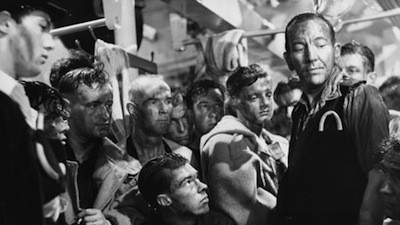
Jamie S. Rich is a novelist and comic book writer. He is best known for his collaborations with Joelle Jones, including the hardboiled crime comic book You Have Killed Me, the challenging romance 12 Reasons Why I Love Her, and the 2007 prose novel Have You Seen the Horizon Lately?, for which Jones did the cover. All three were published by Oni Press. His most recent projects include the futuristic romance A Boy and a Girl with Natalie Nourigat; Archer Coe and the Thousand Natural Shocks, a loopy crime tale drawn by Dan Christensen; and the horror miniseries Madame Frankenstein, a collaboration with Megan Levens. Follow Rich's blog at Confessions123.com.
|
| Popular Reviews |
| Sponsored Links |
|
|
| Sponsored Links |
|
|
| Release List | Reviews | Shop | Newsletter | Forum | DVD Giveaways | Blu-Ray | Advertise |
|
Copyright 2024 DVDTalk.com All Rights Reserved. Legal Info, Privacy Policy, Terms of Use,
Manage Preferences,
Your Privacy Choices | |||||||









